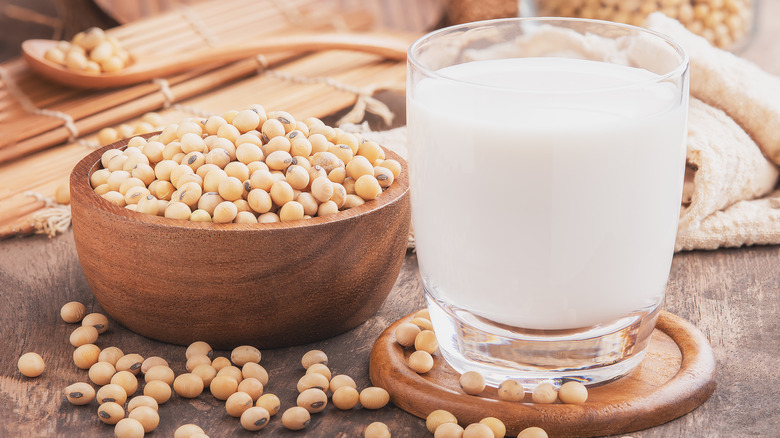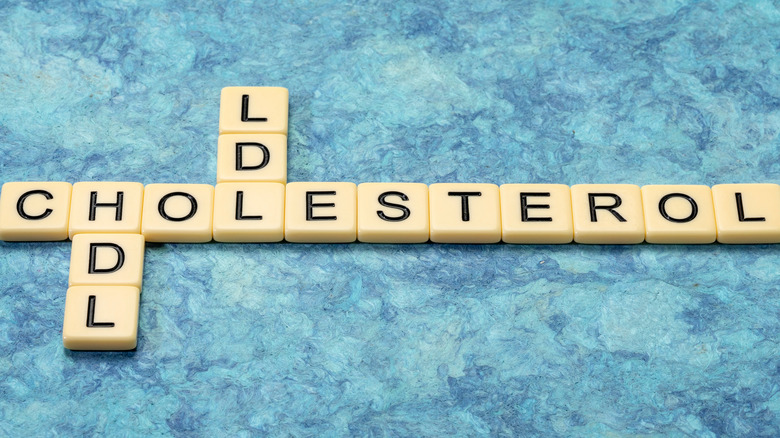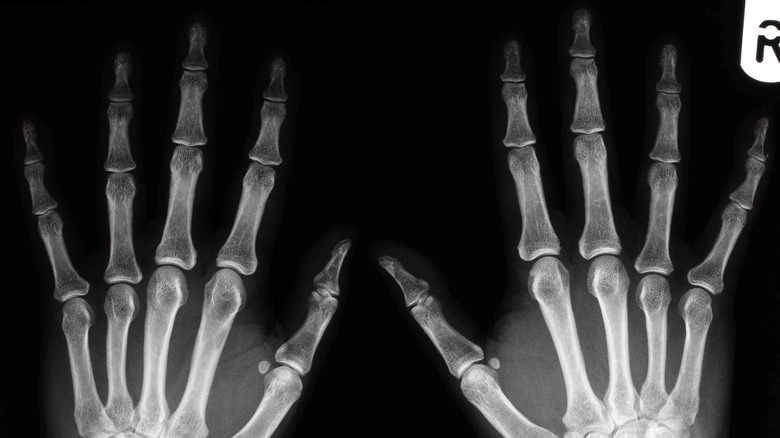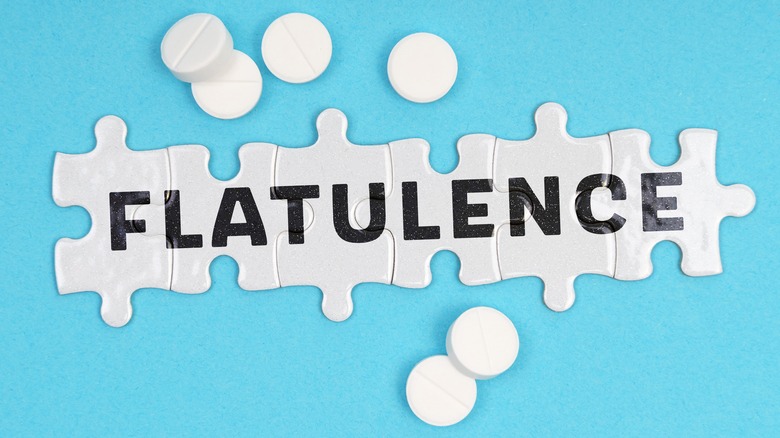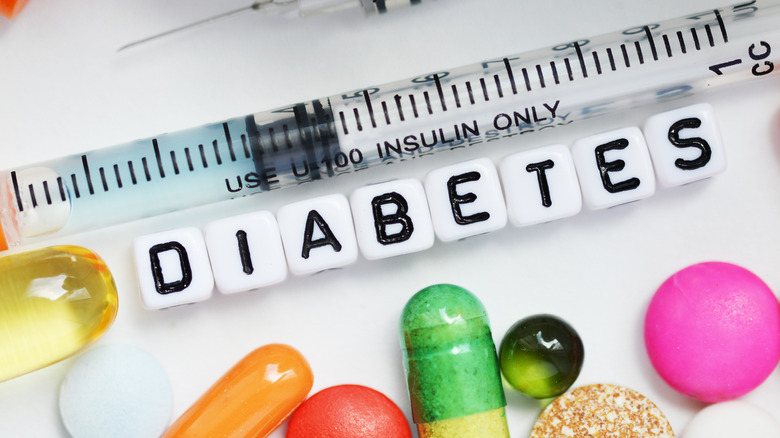What Happens To Your Body When You Drink Soy Milk Every Day
Sometimes, it's obvious which foods are better for you. A nice ripe red apple is usually a good choice for a healthy snack, while a slice of triple chocolate cake is loaded with unhealthy ingredients. And then there are products made from soybeans, like soy milk, which are typically marketed as smart options for the health-conscious (via Cleveland Clinic).
As Healthline explains, there are two main ingredients in soy milk: soaked soybeans and water. However, manufacturers do add foods like oil, vanilla, cocoa, cane sugar, and salt, as well as vitamins and minerals. Of course, how much of these ingredients are added varies. For example, cocoa is typically added to soy milk when they want to give it a flavor similar to classic chocolate milk. Plus, some brands offer both sweetened and unsweetened soy milk options, which does affect the sugar content.
Yes, there are a wide variety of soy milks on the market. But even the most basic ones have been the subject of debate along with other soy products. Research findings regarding soy have been contradictory, which can leave one wondering if soy anything is a healthy choice. Of course, it's always a good idea to speak with a healthcare professional before adding a certain kind of food to your diet, especially if you have any health conditions or concerns. With that said, learning more about a product like soy milk (including the conflicting information) can help you ask the right questions and address your particular needs.
It won't trigger lactose intolerance issues
Chances are you've heard of being lactose intolerant. But just to make sure we're all on the same page, lactose is a type of sugar found in cow's milk (via SFGATE). If someone is lactose intolerant, then consuming dairy products can cause issues like diarrhea, gas, and bloating. Soy milk, however, doesn't have lactose, so it can be a good option for someone with problems digesting lactose. But is it the best option?
Well, there's also lactose-free milk, which has calcium just like regular cow's milk. However, companies that make soy milk do sometimes add vitamins and minerals, including calcium. But if you think it's just a question of checking Nutrition Facts Labels and picking a soy milk with a certain amount of calcium, think again. According to Harvard (as cited by SFGATE), our bodies absorb more of the calcium in cow's milk than the calcium added to soy milk.
Although soy milk might fall a little short compared to lactose-free milk when it comes to calcium, it does check other health boxes. For one, some brands of it are fortified with vitamin D, an important nutrient found in cow's milk. It's also lower in fat than some cow's milk like whole milk. With that said, there are lactose-free milks that are also low fat. So, if you're lactose intolerant, you might want to shop around for a brand of soy milk that fits into a balanced, lactose-friendly meal plan.
You might get stomach cramps
Just as foods like peanuts and shellfish can trigger allergic reactions in certain individuals, so too can soy milk. As the American College of Allergy, Asthma, & Immunology (ACAAI) explains, being allergic to soy and soy products is actually quite common. It's worth noting that even infants can have a soy allergy and react to products like formulas that contain soy.
Soy products like soy milk can trigger a number of symptoms if someone has a soy allergy. For example, a person with this health concern could have breathing issues like wheezing, coughing, shortness of breath, and difficulty breathing in general. They also might develop hives, or their skin could become paler or turn a bluish color. An allergic reaction to soy can also cause issues like indigestion, stomach cramps, vomiting, and diarrhea. Other potential symptoms include a swollen tongue and/or lips, tightness in the throat, hoarseness, confusion, dizziness, and a weak pulse. And while it's not a common occurrence, it's possible for a person with a soy allergy to experience anaphylaxis, a medical emergency where the individual can go into shock.
It might interfere with thyroid medication
Before we dive into this topic, we need to talk about hypothyroidism. As the Mayo Clinic explains, this pertains to when your thyroid isn't producing the right amount of different hormones. Now, some people can have an underactive thyroid and not realize it, but for others, this health issue can come with symptoms like memory problems, weight gain, fatigue, thinning hair, and the thyroid itself becoming enlarged.
Like many medication conditions, diet can play a factor when it comes to hypothyroidism. But according to the Mayo Clinic, there's conflicting information about whether or not someone with a sluggish thyroid should consume soy products like soy milk. As the Harvard T.H. Chan School of Public Health points out, there is evidence that soy supplements have a mild impact on the thyroid but don't cause the thyroid to produce more or less hormones. However, there is also evidence supporting that soy might interfere with medication given to patients for hypothyroidism. Still, per the Mayo Clinic, even if someone has an underactive thyroid, there isn't a factual basis for cutting soy entirely out of their diet.
So, what's the bottom line regarding soy milk and hypothyroidism? If you have a sluggish thyroid, you should be under a medical professional's supervision. They might advise you to wait four hours between when you take hypothyroidism medication and when you consume a soy-based product like soy milk.
Soy milk and your heart
It's not surprising if you've heard conflicting information about soy and heart health. Research in the Journal of the American Heart Association notes that in 1999, the Food and Drug Administration (FDA) supported the claim that protein found in soy could lower the chances of developing coronary heart disease. However, despite being based on scientific evidence and consensus, the FDA reevaluated this decision in 2007. Roughly 10 years later, the FDA considered revoking their original support because there wasn't a consensus in the scientific community.
But just because there is debate about soy and soy products like soy milk doesn't mean an absence of evidence of soy's potential heart health benefits. As the American Heart Association (AHA) points out, the isoflavones found in large quantities in soy might reduce the odds of developing heart disease. Research in the journal Circulation found premenopausal and postmenopausal women who weren't taking hormones were less likely to develop heart disease if they consumed the soy product tofu. However, the study also found that soy milk, which is processed more than other soy products and can contain sugar, didn't offer the same heart health benefits as tofu.
Ultimately, additional research is needed before we can say with complete certainty that soy can lower the risk of developing heart disease. With that said, it's also important to discuss soy milk's possible impact on two other conditions that can affect the heart: cholesterol and blood pressure.
It might help with menopause-related hot flashes
Even if there's no chance you'll experience it, you've probably heard of menopause (a.k.a. when the menstrual cycle stops), via the Mayo Clinic. And while this is as natural as starting menstruation, it can come with a number of unpleasant symptoms, including hot flashes (per WebMD).
Although hormone replacement therapy (HRT) can help with hot flashes, a study from the Women's Health Initiative found that it also might raise the chances of invasive breast cancer, as well as developing heart disease or experiencing a stroke. Soy has been explored as a potential alternative treatment to HRT, as soy and soy products like soy milk contain isoflavones that have estrogen-like properties. If estrogen administered during HRT can reduce hot flashes, maybe isoflavones can as well. However, research has been mixed, with some studies finding soy isoflavones make a notable difference when it comes to hot flashes and others noting little to no improvement. In addition, a study involving rats found soy products affected their estrus cycle (via Science Daily). In other words, it affected when the animal was in heat (via Britannica). As the study states, this is the equivalent of "early onset of menopause in a human."
Should you have soy milk if you're menopausal and experiencing symptoms like hot flashes? The first step is speaking with a medical professional who can make recommendations regarding soy and soy products, as well as other treatment options.
It contains protein for muscles
Did you know that there are bodybuilders who drink a gallon of cow's milk daily? While this might sound like a great deal, according to Livestrong, this isn't an uncommon occurrence, because cow's milk is a good source of what muscles are made of: protein. Interestingly, soy milk has a comparable amount of protein when compared to cow's milk. But there are some important details to keep in mind.
Your body needs enzymes like trypsin in order to digest protein — and there's concern that soy milk contains substances that can block enzymes. This would mean that the body wouldn't be able to break down the protein as thoroughly as it would with other foods that contain protein but no enzyme inhibitors. Nutritionist John Robbins says that the impact from the enzyme inhibitors found in soy milk doesn't greatly affect how well one can digest the protein in soy milk.
However, a study in the American Journal of Nutrition (cited by Livestrong) found that men who drank skim milk after working out developed twice as much muscle as those who drank soy milk. Why there was a difference isn't known, although enzyme inhibitors are a possibility (as is soy milk not containing components of cow's milk like whey and casein).
You might improve your cholesterol management
Did you know that your body needs cholesterol? As the American Heart Association (AHA) explains, cholesterol is crucial for functions like buildings cells and producing hormones. Okay, but what about all the concerns around lowering cholesterol?
It's important to keep in mind that there's more than one type of cholesterol, and the low-density lipoprotein (LDL) type is what's considered the "bad" cholesterol (via the Mayo Clinic). Normally, there's a balance between LDL and HDL (high-density lipoprotein, a.k.a. "good" cholesterol). However, when that balance is off and there's more LDL and less HDL, that's when cholesterol can increase the chances of developing health problems like heart disease (per AHA). And if you consume large amounts of saturated and trans fat, that can lead to your body producing too much "bad" cholesterol, which brings us to soy milk.
As the Mayo Clinic notes, while soy might slightly lower "bad" cholesterol. The more significant reason why soy and soy products could be good for a cholesterol management diet is because they are lower in saturated fat than animal-based food products. Thus, eating soy-based foods instead of animal-based foods might help to reduce cholesterol.
It might help lower your blood pressure
If you have high blood pressure, then anything that might help lower it is worth exploring. After all, as WebMD notes, this health condition can raise the odds of developing heart disease and/or experience a stroke.
Soy milk could be a good addition to a blood pressure management diet, partly because it contains the mineral potassium. High blood pressure and unhealthily high sodium levels can go hand in hand — and potassium helps your body get rid of excess sodium. There can be nearly 300 milligrams of potassium in a single cup of soy milk. Now, of course, cow's milk does contain more potassium than soy, but some people have problems digesting dairy products because they contain lactose (per SFGATE). In addition, soy milk has compounds called isoflavones that research has shown might help with high blood pressure in young adults.
Of course, if you have high blood pressure, you should be under a medical professional's care. Not only can they advise you about soy products like soy milk and your specific health needs, but they can also recommend potassium supplements. In fact, you shouldn't begin taking potassium supplements without speaking to your doctor first, since too much potassium can be bad for your kidneys (via WebMD).
It might support your brain's health
Like many aspects of soy and soy products like soy milk, we're still researching their possible benefits. However, there have been some promising findings regarding soy milk's potential to support good brain health.
According to WebMD, soy milk is a good source of omega-3 fatty acids. There's evidence that omega-3 can lower one's chances of developing different types of dementia, which covers cognitive issues such as memory problems and difficulty reasoning and thinking (per Johns Hopkins Medicine). Symptoms can vary from person to person, and can include changes in personality, visual hallucinations, and confusion. Additionally, Johns Hopkins Medicine points out that Alzheimer's disease is a form of dementia. And yes, there are findings that omega-3 fatty acids like the kind found in soy milk might reduce the odds of developing this disease.
In addition to omega-3 fatty acids, research in Nutritional Reviews found that the isoflavones in soy might also make one less likely to develop dementia, Alzheimer's, and cognitive decline.
It might be beneficial for your bones
Like other aspects of soy and soy products, the research is mixed regarding soy and bone health (via Everyday Health). However, studies have revealed some positive findings, especially for people who are experiencing menopause.
Think of your bones as a building, where different parts of it are regularly torn down and replaced. Now, imagine if you began breaking down different parts of the building, but without replacing them as quickly and fully as you were before. Eventually, that would weaken the building. The same thing happens with our bones, and estrogen helps make sure we replace bone tissue at the right rate so our bones remain healthy and strong. But as Dr. Kelsey Mangano, an assistant professor of nutrition at the University of Massachusetts in Lowell, told Everyday Health, the body produces less estrogen during menopause, which can lead to weaker bones. The isoflavones in soy, however, are similar to estrogen, which might mean they can help the body compensate for its lower estrogen levels and help bones rebuild.
In addition to isoflavones, soy milk is sometimes fortified with vitamin D and calcium, which are also good for your bones. Soy milk also contains another nutrient for good bone health: protein. Take note, however, that there are some concerns about just how well the body can digest the protein in soy milk (via Livestrong).
You'll probably consume more antinutrients
A common phrase in advertising is a food product is "packed with nutrients." But even when something has vitamins and minerals, it can also contain substances called antinutrients, which prevent your body from absorbing nutrients (via Harvard). Additionally, antinutrients, like the kind found in soy milk, can interfere with how your body digests carbs and protein, per Medical News Today.
Soymilk comes from soybeans, and these little legumes have more than one kind of antinutrient. For instance, soy has phytates or phytic acid, as well as lectins. Both are antinutrients that can make it harder for your body to absorb minerals like calcium, iron, and zinc, according to Harvard. Plus, phytates can interfere with how much magnesium your body takes in, and lectins can impact your body's ability to absorb phosphorus. Also, research in the journal Nutrients found that lectins can interfere with how your body digests carbs. In addition, another antinutrient found in soy, trypsin inhibitors, can disrupt your body's ability to process protein. And that's still not all the antinutrients in soy that can cause digestive issues: A compound known as oligosaccharides can lead to gas.
Fortunately, there's some good news here if you really like soy milk. As Medical News Today notes, there are ways to process soybeans to reduce their antinutrient content. So, you might need to do a little extra research to find the best brand for your health concerns and goals.
The right kind can help manage diabetes
Blood sugar management is a very important aspect of living with diabetes. In fact, the Centers for Disease Control and Prevention (CDC) states that it's crucial for a diabetic to monitor their blood sugar levels on a regular basis. So, unsweetened soy milk can be a good option for this health condition, via Livestrong. But there are some things to keep in mind.
Okay, let's begin with some beverage basics. As registered dietician Hillary Hart told Livestrong, the sugar in cow's milk (known as lactose) can raise one's blood sugar levels. And as we discuss elsewhere in this article, soybeans don't have lactose (via SFGATE). But that doesn't mean soy milk can't contain ingredients like cane sugar. Plus, as the Mayo Clinic notes, nonfat skim milk has consistently more nutrients than soy milk, which can vary since different manufacturers might choose to fortify it with different amounts of vitamins and minerals.
The ingredients in different types of soy milk can really change the amount of sugar found in them. According to the U.S. Department of Agriculture (USDA), 100 grams of unsweetened soy milk, like the kind you might find on a shelf in a grocery store, might have around half a gram of sugar. That same amount of a particular brand of chocolate soy milk can contain 7.86 grams of sugars (per USDA).
It might affect your kidneys
Imagine this: You've invited your friend to a concert, only to learn that they hate the performer's music so much that they say, "I'd rather pass a kidney stone." Even if you've never had a kidney stone, you understand it immediately. This condition can be painful, and so it's not surprising that a person worried about kidney stones would explore every way to lower their chances of developing them. But like so many aspects of soy and soy products like soy milk, this is yet another area where the findings are conflicting.
Research from the American Chemical Society concluded that the oxalate in soy and foods made from soy might increase the chances of developing kidney stones (via Science Daily). This is because oxalate and calcium are two key components of a type of kidney stone. However, registered dietician Dr. Kristina Penniston told the University of Wisconsin that oxalate-rich foods tend to contain other components that could inhibit kidney stones from forming. Additionally, not getting enough calcium (which is added to some soy milks) can lead to your body absorbing too much oxalate, which can result in calcium oxalate stones.
In addition, WebMD notes that opting for soy milk instead of animal-based foods might lower your chances of developing another type of kidney stone: uric acid stones. These can form when the urine becomes more acidic than normal, which can occur as a result of consuming protein from animal products.
Does soy milk cause or prevent cancer?
There's a great deal of debate and conflicting information regarding soy-based products and cancer.
According to the American Cancer Society, the isoflavones in soy have estrogen-like qualities. Since high amounts of estrogen might increase the chances of developing different forms of breast cancer, there is concern that isoflavones might have the same effect. Some research does support this potential connection between isoflavones and breast cancer. However, it's important to keep in mind that some studies involve humans while others involve animals like rodents, which are exposed to large amounts of isoflavones. Plus, rodents and humans don't process soy the same way. Moreover, human studies tend to conclude that soy either lowers the chances of developing breast cancer or has no impact. And as Harvard explains, there's data suggesting that soy might block estrogen, which might reduce the chance of developing breast cancer.
In addition, certain isoflavones in soy might lower the chances of developing prostate cancer. That said, two different studies found that soy didn't seem to have a noteworthy effect on the production of a protein that can be a key indicator if a man is developing prostate cancer.

